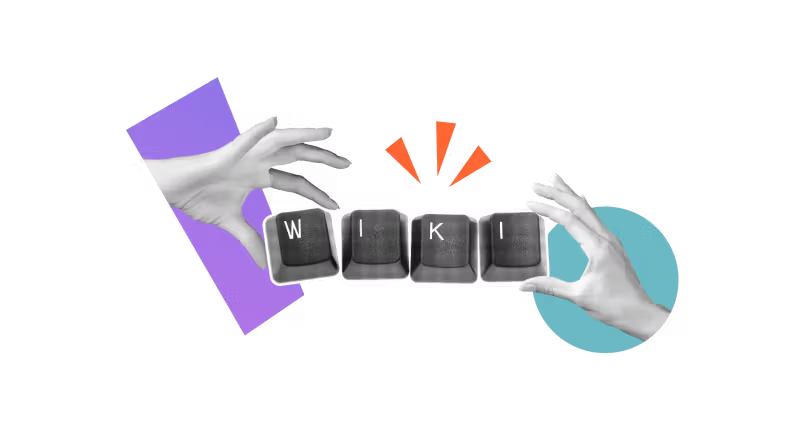What is a wiki? A guide to organisational wikis
Share on socials
What is a wiki? A guide to organisational wikis

Jump to Section
Jump to section
What is a wiki?
What is a wiki used for?
Five features to look for when choosing a wiki platform
Our 3 favourite wiki platforms
Ready to champion knowledge-sharing in your company? We share what a wiki is, when to use one, and our favourite wiki platforms.
Overwhelmed by too much information and not enough collaboration? Enter the wiki - a simple yet powerful tool that strengthens knowledge sharing. Let’s explore how wiki pages can help you cut through the chaos.
If you’re not sure whether a wiki is right for your team, our article on wikis vs knowledge bases will help you make the right choice.
If you’re not sure whether a wiki is right for your team, our article on wikis vs knowledge bases will help you make the right choice.
What is a wiki?
A wiki platform lets multiple users collaborate by creating and editing content. It’s a centralised way to share knowledge efficiently. So whether the wiki is public (like Wikipedia) or an internal wiki for employee-only access, these dynamic websites let users work together to add, remove, and edit content.
A wiki gives users quick access (hence its Hawaiian origins, ‘wiki’ meaning ‘quick’) to valuable content through wiki links, which are pages hyperlinked to other relevant pages within the same wiki.
This Single Source of Truth helps preserve knowledge, enhance productivity, and improve collaboration and communication.
What is a wiki used for?
A wiki is helpful for any instances where you’d benefit from centralising information. Here are a few ways organisations commonly use wikis:
- Idea generation: Keeping track of everyone’s ideas can be challenging, with great ideas slipping through the net or forgotten about. But with a wiki, you can brainstorm and categorise your ideas in one place. Having a centralised system for storing and sharing ideas can help everyone stay on the same page.
- Project management: If you’re developing new software or you’re getting a product to market, a wiki can keep all the important information in one place. Not only can everyone access the same data, but updating your project plans in one place helps everyone to work to the same timeline.
- Collaborative document editing: Let's say you’re writing a new onboarding document, but you need input from 10 other people. Instead of creating your version, saving it, and emailing your team mates for feedback, you can create a draft page within your wiki. Here, everyone can edit the same document, make changes, comments and more, making collaboration much more effortless and time-efficient.
Five features to look for when choosing a wiki platform
Each wiki comes with unique features, but here are some common ones to look out for:
1. Page editing functionality
A dynamic approach to editing content is far superior to static word-processing documents. Being able to live edit a page or encourage multiple users to suggest page edits within the same document is essential for collaboration.
2. Version history
The ability to review a document's version history with tracked changes helps you see who edited what (and when). This is particularly useful if mistakes have been made, which holds everyone accountable, or if you want to restore an older version.
3. Internal linking
The entire purpose of your wiki is to make information accessible to your employees. You can’t foster that collaborative learning experience without internal links! Linking pages together helps improve user experience and makes your wiki helpful.
4. Comprehensive search engine
You could have the most useful content in your wiki, but it's pretty useless if people can’t find it. Find a platform that helps you tag and categorise all your content. The time you invest in curating your wiki means you want employee adoption to be high, which is why you need an advanced search engine.
5. User access controls
You’ll want administrator controls should you need to revoke user access or downgrade permissions. Assigning different permission levels helps create a content creation hierarchy, resulting in organised wiki creation. Otherwise, anyone can create pages and spaces without any order or significance.
Our three favourite wiki platforms for collaboration
Creating a wiki starts with finding a platform that aligns with your business needs. Here are a handful to check out. If you want more information, our guide to the 16 best collaboration tools will help.
Confluence
Confluence’s user-friendly interface is great for organisation-wide usage to build on team culture and engage users openly and authentically. Confluence comes with a range of features to help you find and categorise content, as well as live editing and page history features. Its intuitive design could be a good fit for you, particularly if you’re a small business with remote or in-house teams in the IT and support space.
Learn more: How to create a Confluence wiki
Notion
Notion is an excellent platform for building a wiki to enhance collaboration if you have product teams. Use their pre-built wiki templates to create personalised homepages quickly and easily for every team in your company.
ClickUp
If you’re searching for an all-in-one productivity platform, ClickUp is worth checking out. The cloud-based software helps teams collaborate, from brainstorming ideas to project management. Features like Gantt charts and online whiteboards help foster a creative remote learning environment.
To sum up
Wikis are a great way to improve team collaboration and knowledge sharing throughout your organisation. Most platforms offer a free trial or a free subscription, so it’s easy to get started straight away. What are you waiting for?
Do even more with your Confluence wiki
Organise your content, boost collaboration, and enhance engagement with our range of Confluence apps.
Written by

Content Writer
Helen is a freelance content writer specialising in Software as a Service (SaaS). She has a BA Hons degree in English, a Chartered Institute of Marketing qualification, and over ten years of experience in content marketing.



